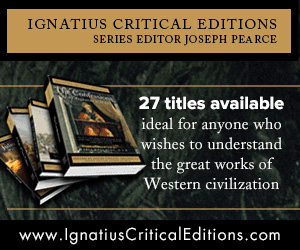
Joseph Pearce is the author of numerous literary biographies, including books on J.R.R. Tolkien, G.K. Chesterton, Oscar Wilde, and Alexander Solzhenitsyn. His passion and enthusiasm for literature is apparent to anyone who has ever met him or read his work. Ignatius Press Novels spoke with him about the Ignatius Critical Editions, as well as about his work as biographer, how Catholic readers can get involved with promoting a new generation of literary Catholics, and much more.
There are so many editions of the classics out there. Why should the reader seek out the Ignatius Critical Editions?
Pearce: The Ignatius Critical Editions were launched to provide a tradition-oriented alternative to the Norton Critical Editions and other similar series, which have succumbed to the radical relativism of postmodernism and its offshoots, such as feminist criticism and queer theory. These mainstream editions warp the original meaning of the great works through what can best be described as literary abuse. The Ignatius Critical Editions, by way of contrast, respect the integrity of the works and the intentions of the authors, most of whom were devout Christians whose works reflect their living faith.
Many of the classic works in the Ignatius Critical Editions are from over a hundred years ago. Given our contemporary obsession with newness, let’s play devil’s advocate and ask bluntly: What is the point in reading literature by people that far removed from our current enlightened age?
Pearce: Only a fool or a charlatan believes that we have nothing to learn from our elders. In this sense we should see history as the science of the past which allows us to learn from the collective and collected experience of humanity over many centuries. The great works of literature are beautiful expressions of that collective inheritance, showing us the truth of the permanent things and the truth about ourselves that we can see reflected in the permanent things. In short and in sum, reading the classics liberates us from the narrow-mindedness of the fads and fashions of our own time and connects us with the bedrock realities of what it is to be truly and fully human.

How can knowledge of the classics shape our understanding of contemporary literature?
Pearce: The classics enable us to judge the present from the telescopic perspective of the past. Good contemporary literature is always rooted in the past, in the sense that it is influenced by the great literary works that precede it. This rootedness makes good contemporary literature part of a continuum of culture. Any contemporary literature which endeavours to ignore the classics will be fatally flawed by its embrace of the shallow and the superficial. Such literature, in refusing the life-giving roots of tradition, will wither and die within a few years of its being published because, as C. S. Lewis reminds us, fashions are always coming and going, but mostly going! If an author is preoccupied with being “up-to-date” his work will very quickly be out-of-date and therefore unread and forgotten. The classics, being rooted in those aspects of humanity which are perennial, have a shelf life measured in centuries, not months!
 If you had to choose one classic work of literature as a “desert island book”, which would it be and why?
If you had to choose one classic work of literature as a “desert island book”, which would it be and why?
Pearce: This is a tough question! If I could only take one work of literature to the desert island, I would probably choose Dante’s Divine Comedy, though in a weaker moment I might choose The Lord of the Rings! I presume that The Collected Works of Shakespeare would not be allowed because it’s not “one classic work of literature” but an entire corpus. If I could only take one Shakespeare play, I would choose Hamlet, though the Ignatius Critical Edition of The Merchant of Venice, which contains some simply superb critical essays, would be a good second choice. But how could one live without King Lear? To reiterate, you have asked the toughest of questions!
It’s interesting to note that the last few popes have been very interested in literature. Pope Paul VI enjoyed the novels of Graham Greene, John Paul I composed tributes to Charles Dickens and G.K. Chesterton, John Paul II wrote poetry and plays, Benedict XVI’s writing is peppered with allusions to authors ranging from Goethe to C.S. Lewis, and Pope Francis has recommended reading Dante and Manzoni. Why do you think these very spiritual leaders are so interested in this very earthy art form?
Pearce: The more that one is steeped in the fullness of the Faith, the more one realizes that the good, the true and the beautiful are a reflection of the unitive power of the Trinity. As such, the greatest works of beauty are also the greatest works of goodness and truth. Great art is the best way to express great truth! As your examples illustrate, the popes seem to know this.
You’re best known as a literary biographer, having written biographies of G.K. Chesterton, Oscar Wilde, J.R.R. Tolkien, Hilaire Belloc, and Alexander Solzhenitsyn. Why should readers seek to know more about the men and women who wrote the books they enjoy?
Pearce: Apart from the fact that people are interesting in their own right, every work of literature is in some sense an incarnation of the deepest held beliefs and presuppositions of the author. The more that we understand the authors of these works, and especially the more that we understand their religious and philosophical beliefs, the more we will understand the works that they wrote.

From your vantage point, do you see a contemporary revival of Catholic literature coming in the future? Or is it already here?
Pearce: I do see a very exciting revival in Catholic literature. The number of new and good Catholic novels and short stories being published seems to be increasing exponentially. There is also a new generation of very good Catholic poets. The difference between this new Catholic literary revival and the earlier one of which I wrote in Literary Converts is that Catholic fiction and poetry is no longer accepted as part of the mainstream. Christianity is ostracized in our secular fundamentalist culture so that Catholic literature is effectively banned by secular publishers and banished from the wider culture. I am convinced that a novel as brilliant as Brideshead Revisited would probably be rejected by today’s secular publishers, such is the intolerance of the culture towards Catholicism. This means, in effect, that Catholics will need to look in the catacombs for the new Catholic works of literature, which is to say that they will have to start buying the new novels being published by good Catholic publishers like Ignatius Press!
While the classics are invaluable, supporting new writers is also essential to a healthy literary ecosystem. Can you point out some places readers should be looking for new talent?
Pearce: As stated above, Ignatius Press has been publishing some good new works of Catholic fiction in recent years, as have other Catholic publishers, such as Saint Benedict Press, Wiseblood, Arx, and Tumblar House. Today’s Catholics need to support these publishers and the novelists they publish by purchasing their books. Good writers need good readers! We must all play our part in the new Catholic literary revival. One way that we can do this is by supporting those journals that are actively trying to promote the new revival, acting as cultural catalysts. I would mention especially Dappled Things and the St. Austin Review, the latter of which is the journal that I’ve edited since it was launched in 2001. Both of these journals publish short stories and new poetry, much of which is simply sublime. With respect to poetry, I should mention Kaufmann Publishing, a courageous small publisher which has specialized in publishing new volumes of Catholic verse.
Thanks for taking the time to speak with us here! Two final questions: if readers want to follow your writing, where should they go? And—not that newer is better—what are your most recently published works?
Pearce: I write a weekly column for the Imaginative Conservative and post short pieces to the St. Austin Review’s blog several times a week and write the editorial for each issue. I also write regularly for Chronicles and occasionally for the National Catholic Register and Latin Mass Magazine. My newest book is Frodo’s Journey: Discovering the Hidden Meaning of The Lord of the Rings (Saint Benedict Press). Other recently published books include Race with the Devil: My Journey from Racial Hatred to Rational Love and Beauteous Truth: Faith, Reason, Literature and Culture, as well as new editions of Catholic Literary Giants, Old Thunder: A Life of Hilaire Belloc and C. S. Lewis and the Catholic Church. I’m keeping busy!






Harry Colin
June 3, 2015 at 9:33 am
A most interesting and important interview! Joseph Pearce eloquently makes the case for authentically good literature and his views on emerging Catholic writers of both prose and poetry are encouraging.
I absolutely treasure the Ignatius Critical Editions of classic literature and believe I have acquired them all! The accompanying essays are all very insightful and these books are great values; despite having other editions of these works the Ignatius series has triggered my commitment to re-read (or in some cases, finally finish!) these timeless works. God bless Joseph for his incredible and invaluable output – as our day’s Chesterton we eagerly await his latest contributions!